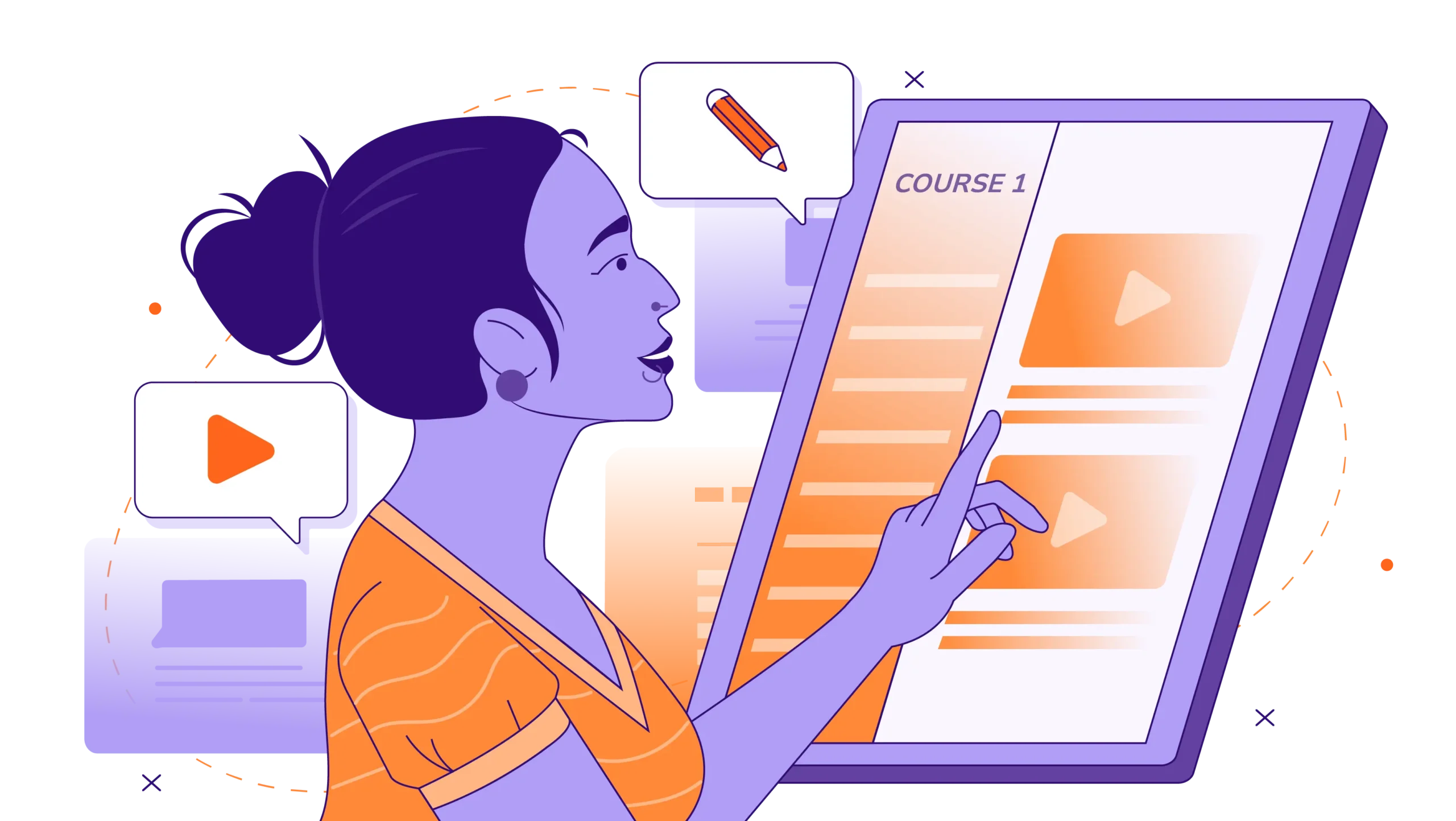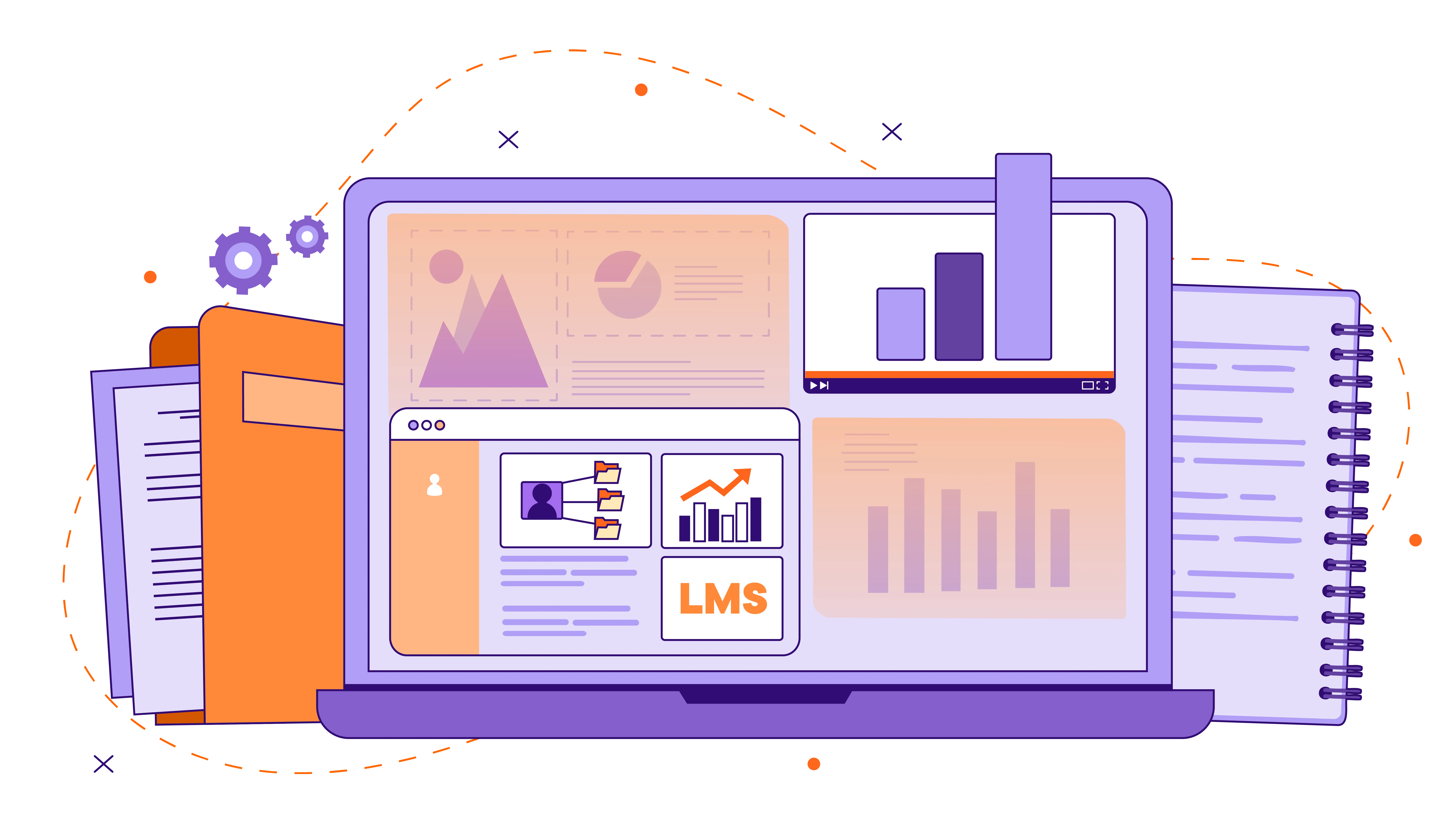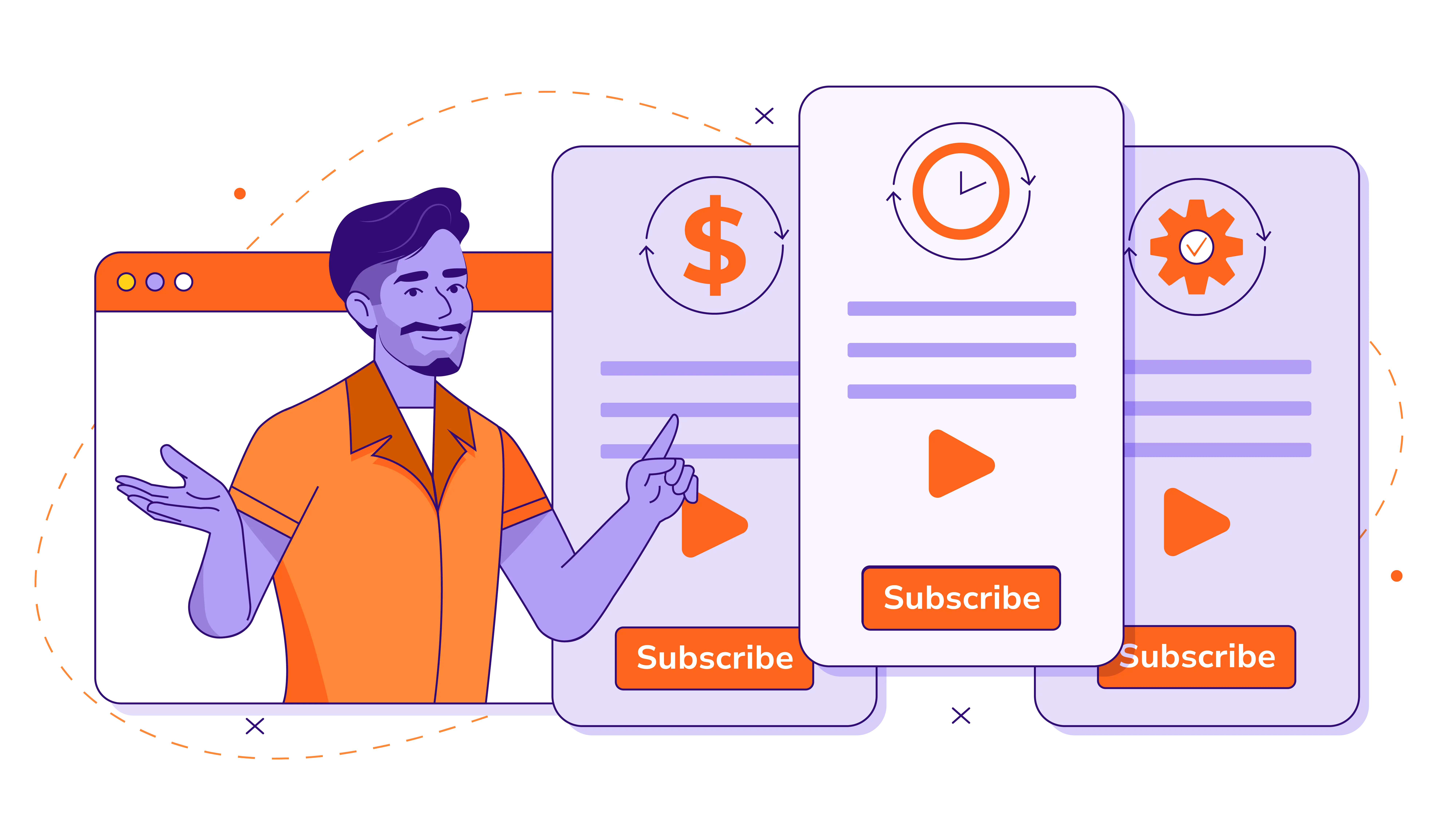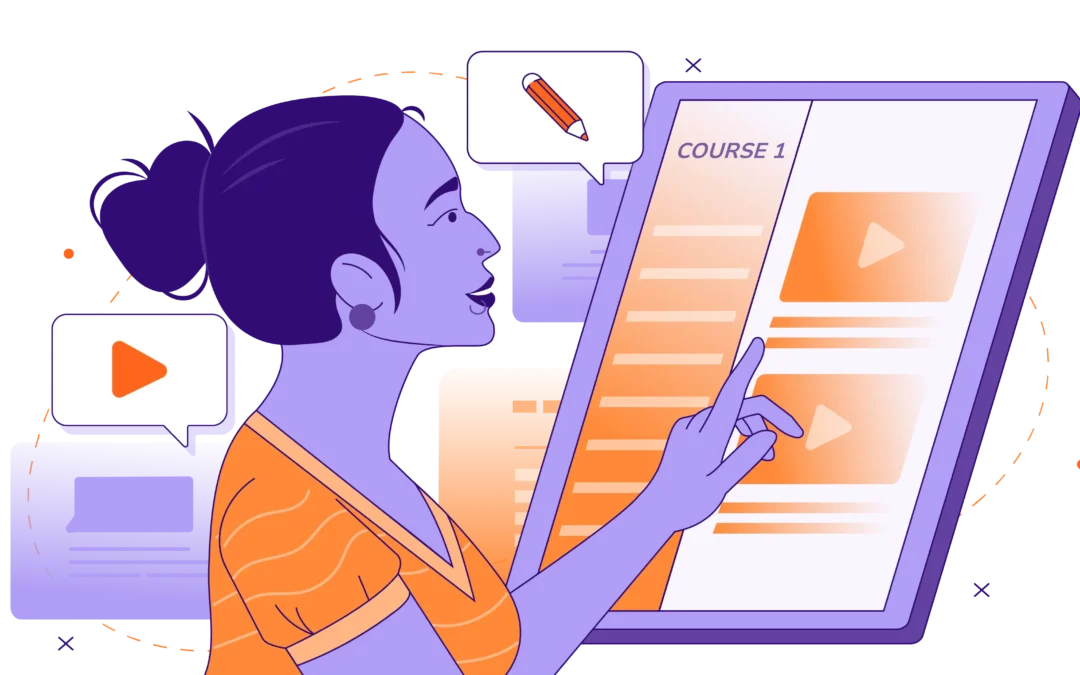
Best LMS for Customer Training (Non-Biased Overview)
In the expanding world of Learning Management Systems (LMS), many platforms offer similar features and functionalities. The key to successful customer training isn’t just about the platform itself, but the quality and relevance of the content you deliver.
This article explores the key details of choosing the Best LMS for Customer Training, emphasizing that while the platform matters, it’s the course design that truly shapes the user experience and drives engagement.
What is a customer training LMS?
A customer training LMS, or learning management system, is a platform designed to deliver and manage customer training and customer education programs. This powerful tool allows businesses to create, organize, and track online learning experiences for their customers. The right LMS can significantly impact customer satisfaction and product adoption.
This powerful tool allows businesses to create, organize, and track online learning experiences for their customers. The right LMS can significantly impact customer satisfaction and product adoption.
Step-by-step instructions that empower customers to solve problems independently.
Why use a learning management system for customer training?
A customer training LMS provides numerous benefits. It streamlines the delivery of customer education, ensuring a consistent experience across all corporate learners. By centralizing online learning resources, an LMS simplifies the management of customer training programs. Additionally, it enables businesses to track progress and measure the impact of their customer training initiatives.
This data-driven approach allows organizations to make informed decisions and optimize their customer education strategies. An LMS can automate many tasks, freeing up time for customer success teams to focus on other priorities.

Key LMS features for eLearning customer training
An effective customer training LMS should have several key features. These include:
Key LMS features for eLearning customer training
User friendly interface:
A clear and intuitive interface makes it easy for customers to navigate the platform and find the resources they need.
Robust reporting capabilities:
Online training reports allow businesses to track learner progress, identify knowledge gaps, and measure the effectiveness of their online training programs. For example, businesses can use reports to determine which online training modules are most popular, which topics are causing difficulties, and how long it takes learners to complete courses.
Integration with other tools:
Customer training integration with CRM systems, marketing automation platforms, and other business tools can streamline workflows and provide a more seamless customer experience. For example, an LMS can be integrated with a CRM system to automatically enroll new customers in relevant training programs or to track customer progress and send reminders about upcoming training sessions.
Gamification features:
Incorporating gamification elements, such as points, badges, and leaderboards, can make learning more engaging and motivating for customers. For example, businesses can use gamification to reward corporate learners for completing courses, achieving milestones, or answering questions correctly.
Mobile optimization:
A mobile-friendly platform ensures that customers can access training materials on their smartphones or tablets, making it easier to learn on the go. This is especially important for busy customers who may not have time to sit down at a computer.
Customization options:
The ability to customize the platform to match your brand and specific training needs can help create a more personalized and effective learning experience. For example, businesses can customize the LMS to use their company logo, colors, and fonts, or to create custom training paths for different customer segments.
Accessibility features:
Ensuring that the platform is accessible to all learners, including those with disabilities, is important for inclusivity and compliance with accessibility standards. For example, businesses can use features like screen readers, keyboard navigation, and captions to make the LMS accessible to learners with visual or auditory impairments.
👉 Check out our award-winning portfolio and explore the endless possibilities of interactive learning 👈
Best LMS for customer training
Learnworlds
Strengths: Learnworlds shines with its flexibility and customization, allowing businesses to create a branded customer training experience. This platform is excellent for interactive content, with features like interactive videos and ebooks to boost engagement. Its robust community and customer support make it a good choice for those needing assistance in building their online learning environment.
Weaknesses: Some users find the interface less intuitive than other options, leading to a steeper learning curve. While its flexibility is a strength, it can also mean more setup time compared to simpler LMS solutions. Pricing can be on the higher end, which might be a consideration for smaller businesses.
Learnworlds
Strengths: TalentLMS is lauded for its user-friendliness, making it a great choice for both administrators and learners. Its clean interface and intuitive navigation contribute to a positive customer experience. It’s also known for being quick to set up, so businesses can start training customers faster.
Weaknesses: Compared to some other LMS platforms, TalentLMS might lack some advanced features, particularly for complex customer training needs. Its reporting capabilities could be more robust for businesses requiring deep data insights. For example, while it can provide basic metrics like completion rates and course engagement, it might be less effective for analyzing specific learning outcomes or identifying knowledge gaps in detail.
Additionally, its integration options might be limited compared to platforms like Absorb LMS or LearnUpon, potentially restricting its ability to seamlessly integrate with other business tools.
Absorb LMS
Strengths: Absorb LMS is a comprehensive platform that offers a wide range of features to support customer training initiatives. Its extensive feature set includes modules for content creation, course management, learner tracking, and reporting. Additionally, Absorb LMS provides strong integrations with other business tools, such as CRM systems, marketing automation platforms, and single sign-on (SSO) providers. This allows businesses to streamline workflows and create a more seamless customer experience.
One of the key strengths of Absorb LMS is its mobile-first approach. The platform is designed to be accessible and easy to use on mobile devices, making it convenient for customers to learn on the go. This is especially important for busy customers who may not have time to sit down at a computer.
Weaknesses: While the platform is feature-rich, its interface might feel a bit overwhelming for some users, especially those who are new to learning management systems. The extensive features also come with a higher price tag, potentially making it less appealing for smaller businesses. However, Absorb LMS offers a variety of pricing plans to accommodate different budgets and needs.
iSpring Learn
Strengths: iSpring Learn is a budget-friendly option that is easy to use. It excels in content creation, especially for converting PowerPoint presentations into online learning modules. Its simplicity makes it ideal for businesses with straightforward customer training needs.
Its user friendly interface and intuitive tools make it easy for even non-technical users to create engaging and effective online training content. iSpring Learn offers a variety of content creation options, including slides, quizzes, simulations, and videos. It also provides templates and themes to help businesses create a consistent and professional look for their online training materials.
While iSpring Learn’s simplicity is a strength, it might limit its scalability for complex online training programs. It lacks some of the more advanced features offered by other LMS platforms, such as advanced reporting and analytics, extensive integrations, and gamification features. However, it is a good option for businesses that need a simple and affordable solution for creating and delivering basic customer training content.
Skilljar
Strengths: Skilljar is a purpose-built customer training platform that offers a range of features designed to enhance the customer experience. One of its key strengths is its focus on automation and scalability. Skilljar’s automation features allow businesses to automate tasks such as course enrollment, content delivery, and progress tracking, saving time and resources. This is especially beneficial for businesses with large or growing customer bases.
Additionally, Skilljar’s scalability ensures that it can handle the needs of businesses of all sizes. The platform can easily accommodate an increasing number of learners and online training programs without sacrificing performance or functionality. This is important for businesses that anticipate growth or want to expand their customer training offerings.
Another strength of Skilljar is its focus on customer engagement. The platform offers a variety of features to make learning more engaging and effective for customers. These features include gamification elements, social features, and personalized learning paths. By making learning more enjoyable and relevant, Skilljar can help businesses improve customer satisfaction and retention.
Weaknesses: While Skilljar’s focus on customer training is a significant advantage, it might be less versatile for other online training types, such as internal employee training or partner training. Additionally, the platform’s pricing structure can be complex, which might be a hurdle for some businesses. However, Skilljar offers a variety of pricing plans to accommodate different budgets and needs.
Northpass
Strengths: Northpass emphasizes learner engagement through a modern and intuitive interface. It offers good customization options, allowing for a branded customer training experience.
Weaknesses: Northpass might lack some of the advanced reporting and analytics found in other platforms. Its pricing might be on the higher side for smaller businesses.
Litmos (Formerly known as SAP Litmos)
Strengths: Litmos is designed for scalability, making it a good choice for enterprise-level customer training. Its focus on gamification helps boost learner engagement.
Weaknesses: Some users find the interface a bit dated compared to newer LMS platforms. The focus on enterprise needs might make it less suitable for smaller businesses.
LearnUpon
Strengths: LearnUpon is user friendly and has a clear focus on customer success and onboarding. It offers tools to track customer progress and engagement, allowing businesses to optimize their online training efforts.
Weaknesses: While its customer success focus is a strength, it might have fewer features specific to other training types. The reporting capabilities might not be as advanced as some other options.
Remember, the best LMS for customer training depends on your specific needs and priorities. Consider factors like the size of your customer base, complexity of your online training programs, budget, and desired features. A well-chosen LMS can empower you to deliver effective online training that enhances the customer experience and drives business success.
Pricing Models For Learning Management Systems
Subscription-Based Licensing
This is the most prevalent model, where businesses pay a recurring fee (monthly or annually) to access the LMS. The fee often scales based on the number of active users or features utilized. This model offers flexibility and lower upfront costs, making it suitable for businesses of all sizes. However, the ongoing costs can add up over time.
Perpetual Licensing
Under this model, businesses pay a one-time upfront fee to own the LMS software license indefinitely. This can be attractive for organizations with long-term online training plans, as it eliminates recurring costs. However, the initial investment can be substantial, and updates or customer support might require additional fees.
Per-User Licensing
Here, the cost is tied to the number of users accessing the LMS. This can be beneficial for businesses with fluctuating user numbers, as they only pay for active learners. However, it’s important to anticipate growth, as costs can increase significantly if the user base expands rapidly.
Usage-Based Licensing
Some platforms charge based on how the LMS is used, such as the amount of storage consumed or the number of courses created. This model can be cost-effective for organizations with limited online training needs, but it’s important to understand the usage metrics and potential cost implications.
Hybrid Models
Several platforms combine elements of different licensing models. For instance, they might offer a base subscription fee with additional charges for premium features or exceeding user limits. These models offer some flexibility but require careful consideration to ensure they align with your usage patterns.
It’s crucial to research each platform’s specific licensing model, as terms and conditions can vary. Additionally, consider factors like your budget, anticipated user numbers, online training program complexity, and long-term goals when choosing a licensing model.
In the world of Learning Management Systems (LMS), many platforms offer similar features and functionalities. However, the true differentiator lies in the quality and relevance of the content you deliver. Remember, a user friendly platform is only as effective as the learning experience it facilitates.

At Ninja Tropic, we understand that content is king. We are dedicated to partnering with you to create engaging and effective customer training programs that drive results. Whether you’re looking for a new LMS or need help crafting compelling content, we are here to help.
Let’s discuss your learning needs and create a customer training experience that truly makes a difference. Contact us today!
DOWNLOAD YOUR KEY TO KNOWLEDGE
Access Valuable Resources to Fuel Your Learning Journey

